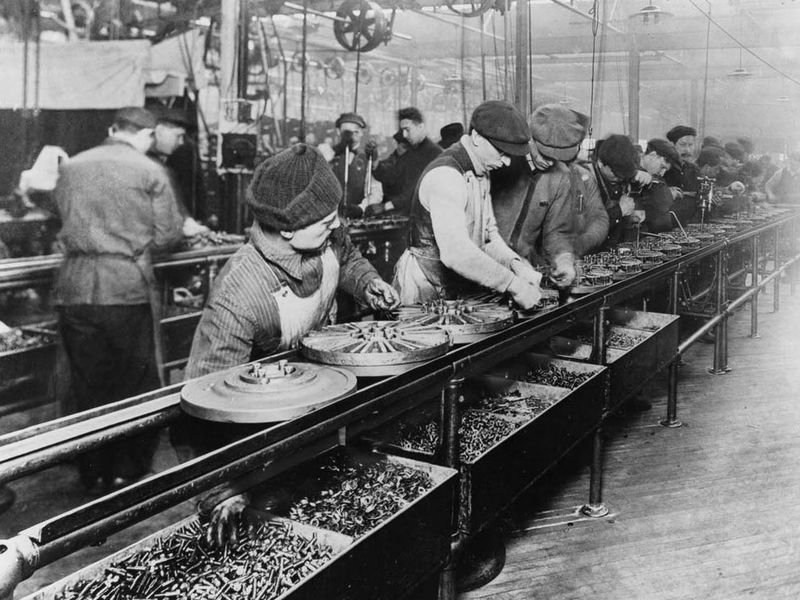Add Value or Create Waste
In the business world, if you are not adding value you are creating waste. It's about eliminating wasted time from a process. Doing so increases efficiency and therefore reduces cost. If an activity does not add value to the final output the customer receives, then the customer probably doesn’t want to pay for someone to perform that activity.
Henry Ford, the father of mass production, captured the essence of this concept when speaking about getting ahead in our careers:
"It has been my observation that most people get ahead during the time that others waste."
And what better place to realize this truth than from within God's word. Paul states it this way, to the disciples in Ephesus:
"Ephesians 5:15-16 Therefore be careful how you walk, not as unwise men but as wise, making the most of your time, because the days are evil."
So when are we adding value and when are we creating waste?
Imagine a short assembly line of just three people. Person 1 takes the product and attaches a component to make it work. Person 2 takes the upgraded product from Person 1 and just looks at it. Person 2 then hands the product to Person 3. Person 3 adds one more component, making the product even better. Person 3 then sends the product to be shipped to the awaiting customer.
Since three people are working in this little assembly line, their individual costs (salary + benefits) must be included in the final product. That means the customer must be willing to pay for time spent by all three employees. This also means the price of the product must be set high enough to cover all three staff costs.
The obvious question is this: What value is Person 2 adding to the product that justifies his cost of employment? The answer is nothing.
This middle individual is not adding value, so can we say he is instead creating waste? The answer is YES!
Waste can be measured in this simple scenario by the following:
Time Person 2 takes to accept handoff from Person 1
+ plus +
Time Person 2 holds the product
+ plus +
Time Person 2 takes to pass product to Person 3
This wasted time could be spent making more products. It is instead spent on nothing valuable.
Another form of waste may be measured in damaged products
Every time Person 2 touches a product, there is risk of dropping that product. Every time Person 2 drops a product, the product is damaged and must be either repaired or discarded. This adds more time and money to the total cost of the process.
The powerful concepts of Lean Management have worked their way from assembly lines into the transactional world of service delivery. No matter what the service model (answering phones at a desk, selling equipment, supporting help desk tickets, installing cable TV, analyzing financial numbers in accounting etc.), Lean principles are at work as much as they are in a manufacturing environment.
If you are not adding value, then do not touch the process. Keep your hands out of it. If you touch it and are not adding value, then you are creating waste.
You can take this concept into every nook and cranny of your work day.
Imagine these common areas of waste in your average working month:
- you join a conference call only to realize you weren’t needed
- people walk into your office to talk but nothing really gets accomplished
- you send an email and must keep sending more reminders as you wait for a response
- several people end up working on the same project at the same time, unknowingly, because no-one informed them the task had been assigned to someone else
I’m sure you can come up with many of your own. There are lots of ways Person 2 is involved in a process and ends up just standing there, holding up the outcome.
Always consider how you can add value to a process
In doing so, you increase your value to a company. Likewise, consider also how you can remove steps in a process that don’t add value. And when you realize you are not adding value, ask the team whether it makes sense for you to be involved.
Streamlining a workflow will ultimately save you and the company precious time. It will also save the customer precious dollars.
"Proverbs 24:30-34 "I passed by the field of the sluggard and by the vineyard of the man lacking sense, and behold, it was completely overgrown with thistles; its surface was covered with nettles, and its stone wall was broken down. When I saw, I reflected upon it; I looked, and received instruction: a little sleep, a little slumber, a little folding of the hands to rest,” then your poverty will come as a robber and your want like an armed man."
Shawn Sommerkamp is a motivational speaker and Executive Coach with 20+ years of Fortune 100 leadership experience. He founded Motivationeer™ to coach Christian professionals how to use their career to glorify God and support local church growth.








